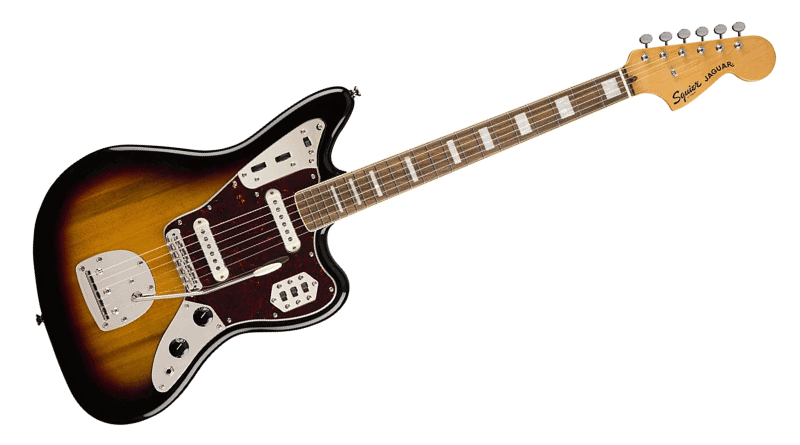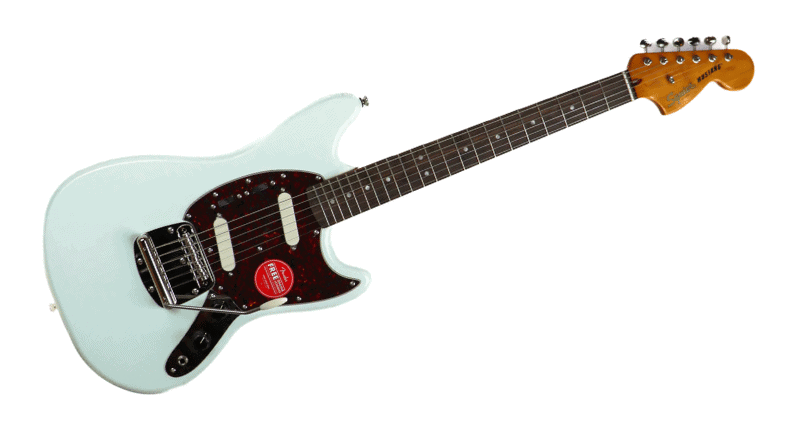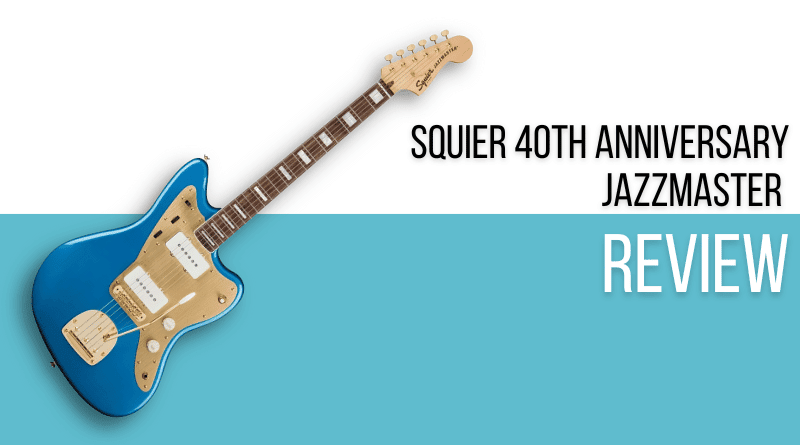Squier has come a long way in the last 3 or so years. No longer are they being considered to be cheap, poorly-made Fender copies. On the contrary, their high-end models could be considered serious workhorses, with models like the Squier 40th Anniversary Jazzmaster at the vanguard of this change in image.
This particular edition of the Jazzmaster celebrates 40 years of what we now know as the Squier brand, and boy, does it do it in style. Unlike Bullet or Affinity models, this is a full-featured Jazzmaster with all the features you’d expect of a Fender version. It even comes with fantastic limited-edition gold hardware.
We named the 40th Anniversary Jazzmaster as our Editor’s Choice in our Roundup of the Best Squier Guitars. Once you’ve finished reading this KillerGuitarRigs Review, we’re sure you’ll see why. In this extended review, we’ll take an in-depth look at the features, build quality, playability, and of course, the tones.
Keep on reading if you’re looking to learn more about this flagship Squier model.
Read more about our review process.
Contents
Squier 40th Anniversary Jazzmaster: Who Is This For?
The Squier 40th Anniversary Jazzmaster is a solid choice for a wide range of players. Its attainable price point and brand recognition will definitely appeal to newer players looking to get started on a better-than-average guitar. And its robust construction and great playability boosts its appeal for more experienced players looking to get into a Jazzmaster without paying Fender money.
Appearance / Features / Controls
Our test model had a Lake Placid Blue finish, which looked fantastic paired with the all gold hardware. Even the pickguard was gold and the neck plate came with a special “40th Anniversary Edition” engraving. If you’d prefer a different color, it’s also available in Surf Green, Olympic White, and Satin Desert Sand.
It came with a maple neck and was topped with a maple fretboard. This is the same no matter which color you opt for, so if you’re not a fan of maple boards, this might not be the guitar for you.
Like most Squier models, it had a poplar body, which really helped keep the weight down. This is especially helpful on Jazzmasters, which are physically large guitars.
The bolt-on maple neck had a C-shape profile, which was very comfortable. It had a 25.5” scale with 24 frets – perfect for exploring an expanded range of chords and scales.
Being a Jazzmaster, it had the classic floating tremolo system. This system is very different than that found on the Stratocaster, but it works so well on this platform. This particular trem bridge is a big reason for the Jazzmaster’s popularity in surf-rock styles. So if that’s your preferred genre, you’ll love this feature.
As for pickups, it came with a pair of Fender-designed Alnico single coils. Visually, they look a lot like soapbar P90s, but they’re much closer to a standard single coil in terms of tone. The hardware was all gold colored, with quality vintage style tuners and a real bone nut.
Performance / Sound
We found that the 40th Anniversary Jazzmaster was a very comfortable player. The offset body provided excellent ergonomics and the inclusion of a belly carve helped with playing comfort while seated.
The setup was excellent right out of the box. If you’ve heard that all Jazzmasters need a neck shim before they’re truly playable, this really isn’t the case with modern versions. It had a great low action, an arrow-straight neck, and the fretwork was absolutely superb.
The neck really worked well with this guitar. The C-shape profile was slim and extremely forgiving, and had a really nice semi-gloss finish on the rear. Like many other Squier and Fender models, it had a 9.5” radius, which keeps it usable for both lead and rhythm players.
Tonally, it had all the chime you could ever want. We found it to be prominent at the top end with a very open sound. The pickups delivered excellent note separation, allowing us to hear every string when playing chords – really impressive stuff for what is supposedly a budget guitar.
One of the things that might intimidate newer players about the Jazzmaster is the array of controls and switches. One of the unique selling points of this guitar has always been the inclusion of its lead and rhythm circuits.
In the lead circuit, as you might imagine, it was at its brightest. When we switched over to the rhythm circuit, we found it to be much warmer. The rhythm circuit had further volume and tone controls in addition to the master tone and volume, which let us dial in an even greater range of sounds.
The reliability was excellent and this is sure to relieve some concerns related to Squier models of the past. Tuning stability was rock solid (provided you aren’t going too hard on the trem system!) and the tuning machines themselves performed well, making fine adjustments to tuning a simple affair.
Other Guitars to Consider
The Squier 40th Anniversary Jazzmaster really is a fantastic guitar, but that’s not to say there aren’t great alternatives around you might like to consider before making your purchase. We’ve highlighted what we think are some of the best, similarly-priced models you might like if you’re interested in the Jazzmaster.
Squier Classic Vibe ’70s Jaguar

The Squier Classic Vibe ’70s Jaguar is another of our favorite Squier models at KGR. It may look very similar to the Jazzmaster, but there are tons of subtle differences that completely change the playing dynamics. Take for instance the Jaguar’s shorter 24” scale length – something that will appeal to Gibson/Epiphone fans and smaller players in general. This is based on the guitar played by the likes of Kurt Cobain and John Frusciante, and we think it’s a great alternative to the Jazzmaster.
Squier Classic Vibe ’60s Mustang

Staying with the offset body theme, the Squier Classic Vibe ’60s Mustang is a great choice for players who want a simpler hardtail guitar with fewer controls and more classic single-coil tones. The original Fender version was originally intended as a student grade model, but like so many affordable guitars in the ’60s and ’70s, it became a punk icon. It’s a ton of fun to play and handles a surprising array of genres with ease.
Final Thoughts on the Squier 40th Anniversary Jazzmaster
The Squier 40th Anniversary Jazzmaster really helped us to rethink our opinion on Squier models. We’ve known for a while that they were on the rise in terms of tone and build quality, but this particular model really demonstrated just how far they’ve come.
It offered great playability and a really interesting range of tones. We have no doubt that it would hold up to gigging and could potentially make for a great mod platform if you’re really looking to make it your own. Whether you’re a beginner or a more seasoned player, this Jazzmaster is a great choice.


